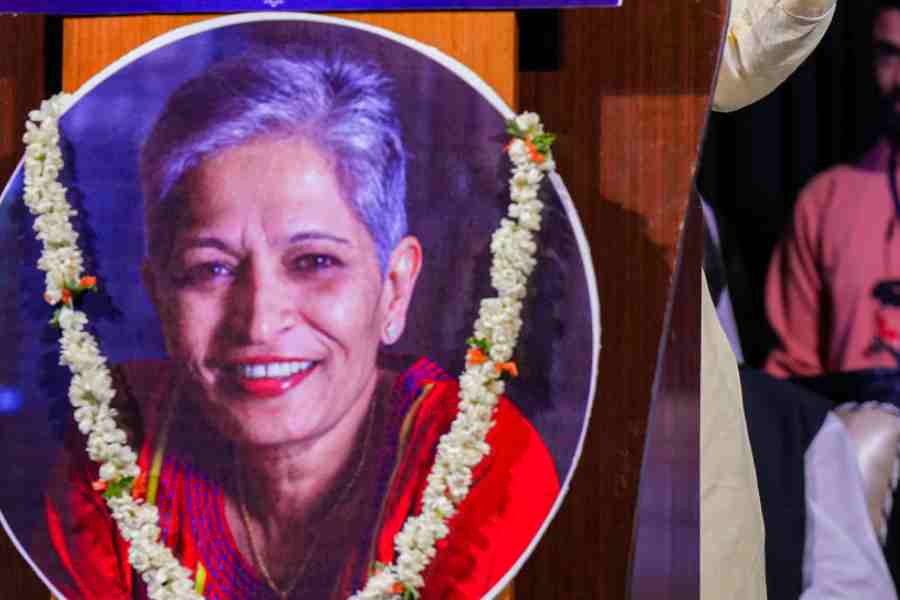All the accused persons arrested in the murder of journalist Gauri Lankesh getting bail has sparked outrage, but the late journalist’s erstwhile lawyer and friend, B.T. Venkatesh, believes the police have done a “fairly good job” in the investigation and “the quality of the trial has been good”.
Lankesh, a journalist and activist who was a staunch critic of Hindutva extremism, was shot dead outside her home in Bengaluru on the night of September 5, 2017, at age 55.
The same year, she was posthumously given the Anna Politkovskaya Award, presented annually by the international human rights organisation RAW in WAR (Reach All Women in War) to a woman human rights defender in a conflict zone.
On January 8, eight years after her death, the last accused in her murder who was in jail, Sharad Bhausaheb Kalaskar, was granted bail by a sessions court in Bengaluru.
A total of 18 persons are accused in the case. One of them, Vikas Patil, is absconding.
Kalaskar was earlier convicted in the murder of social activist and author from Maharashtra, Narendra Dabholkar, by a court in Pune. Dabholkar was shot dead on August 20, 2013 by two miscreants on a bike.
A Pune special court sentenced him to life imprisonment in May 2024 and despite the bail in Lankesh murder case he will likely remain in jail in the Dabholkar case.
The judge had then said the charges under IPC sections 302, 34 and sections of the Arms Act against Kalaskar have been proved “beyond doubt”.
Kalaskar was arrested by Maharashtra ATS in August 2018 in connection with Lankesh murder. His interrogation revealed his involvement in Dabholkar murder.
Parasuram Waghmore and Manohar Yadawe, two of the accused in the murder of Lankesh, were released on bail in October 2024, and reportedly received a grand welcome in Vijayapura in Karnataka.
Another accused, Shrikant Pangarkar, joined the Eknath Shinde-led Shiv Sena in Jalna in Maharashtra ahead of the Assembly polls in 2024.
Venkatesh, who was Gauri Lankesh’s friend for over two decades and represented her in several cases for 17 years, outlined how cases move in India’s judicial system and even pointed to lacunae.
“One of the major constricts we have in India is the bail is queued,” he said. “For example, the Bhima Koregaon case, they are languishing six years, eight years in jail. That is really very bad. Either you have completed the trial within that period or that you should do that. In Gauri’s case, there is substantial progress that has been made in the case. So granting bail in the first instance for an accused person was not warranted. But, given the number of years they have spent in the course of the trial, courts have granted bail to the accused.”
He explained the “ground of parity” under which Kalaskar was given bail.
“Kalaskar is one of the people who has been accused. The ground of parity is because the majority of the 18 accused, 16, have been enlarged on bail. One of the accused, Vikas Patil, is still absconding. The only one who was now in prison was Kalaskar. On that ground, the court has granted the bail.”
Gauri Lankesh’s murder was clearly an organised crime, he said.
“In fact, my construct is, these kinds of organisations and activities need to be under the Unlawful Act Prevent Act and should not be granted bail until the trial is over,” he said.
“Unfortunately, the court also has opined that there is no direct involvement. But he [Kalaskar] was the one who had trained all the accused persons,” he said.
“It is not that he was some licensed trainer. He was doing this training totally illegally. An illegal arms training – that itself is a serious crime. Therefore, when similar kinds of things are done in any of the other cases, say in Naxalite areas, the person never gets bail. No chance of bail until the trial is concluded,” he said.
As a former public prosecutor, he explained: ”In any criminal case, the consequence of session’s trial depends on the quality of the evidence presented by the prosecution, how the evidence is corroborated by the witnesses, and how the strength of the corroboration is without any doubts – that there are no discrepancies in the corroboration. Only in such circumstances the court will have to convict the accused persons. That is settled law.”
He added: “The quality of the trial in Gauri Lankesh’s case has been good,” and the case is being handled by a “staunch and wonderful prosecutor”.
The police have “done a fairly good job,” he said.
“The reality in this country is, there are many factors which are not necessarily law but which result in the decisions of the court,” he said, when it was pointed out that many high-profile convicts get bail and others don’t.
“Those who get bail, by and large, have an enormous amount of clout and influence and the service of the best lawyers,” he said.
“Those who can’t, languish in jail. As a state public prosecutor I have handled these cases many times. In a good number of cases, I had to seek remission of sentence, because it had taken such a long time, or many could not afford to appeal to the Supreme Court.”
He added: “The challenge that we have today is in cases like planned murder like Gauri Lankesh, people get bail. People who are on the ground of being charged in situations which were not planned or without any motive, such cases people are languishing in prison.”











